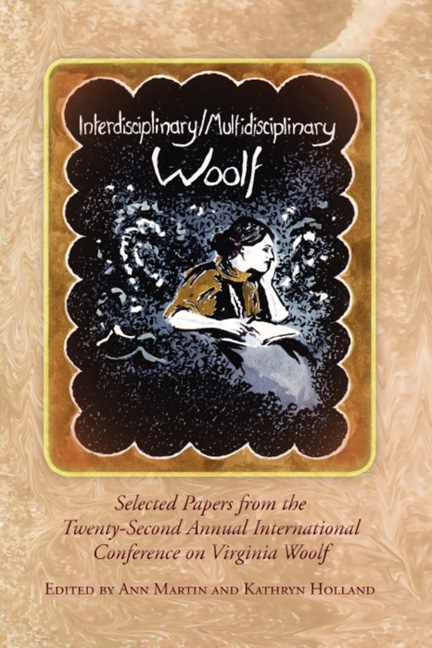Book contents
- Frontmatter
- Contents
- Introduction to Interdisciplinary/Multidisciplinary Woolf
- Acknowledgments
- List of Abbreviations
- History, Materiality, Multiplicity
- Patterns, Practices, Principles
- Art, Influence, Embodiment
- Publishing, Politics, Publics
- “The most unaccountable of machinery”: The Orlando Project produces a textbase of one's own
- The Hotel at the End of the Universe
- Globalization, Inter Connectivity, and Anti-Imperialism: Leonard Woolf, the Hogarth Press, and Kenya
- Chinese Eyes and Muddled Armenians: The Hogarth Press and British Racial Discourse
- “No One Wants Biography”: The Hogarth Press Classifies Orlando
- There Goes the Bride: Virginia Woolf, Julia Strachey, and the Hogarth Press
- Redefining Woolf for the 1990s: Producing and Promoting The “Definitive Collected Edition”
- The Believers: Writers Publishing for Readers, Or Preliminary Musings on The Hogarth Press and McSweeney's
- The Woolfs in Print and Online: A University Press in Transition
- Notes on Contributors
- Conference Program
“No One Wants Biography”: The Hogarth Press Classifies Orlando
from Publishing, Politics, Publics
- Frontmatter
- Contents
- Introduction to Interdisciplinary/Multidisciplinary Woolf
- Acknowledgments
- List of Abbreviations
- History, Materiality, Multiplicity
- Patterns, Practices, Principles
- Art, Influence, Embodiment
- Publishing, Politics, Publics
- “The most unaccountable of machinery”: The Orlando Project produces a textbase of one's own
- The Hotel at the End of the Universe
- Globalization, Inter Connectivity, and Anti-Imperialism: Leonard Woolf, the Hogarth Press, and Kenya
- Chinese Eyes and Muddled Armenians: The Hogarth Press and British Racial Discourse
- “No One Wants Biography”: The Hogarth Press Classifies Orlando
- There Goes the Bride: Virginia Woolf, Julia Strachey, and the Hogarth Press
- Redefining Woolf for the 1990s: Producing and Promoting The “Definitive Collected Edition”
- The Believers: Writers Publishing for Readers, Or Preliminary Musings on The Hogarth Press and McSweeney's
- The Woolfs in Print and Online: A University Press in Transition
- Notes on Contributors
- Conference Program
Summary
Leonard Woolf, “The World of Books,” and Literary Categorization
Leonard Woolf's 1928 essay, “Imaginative Biography,” begins by quoting Egerton Brydges, a nineteenth-century man of letters who defines the genre as follows: “By Imaginative Biography, I mean an Imaginary Superstructure on the known facts of the Biography of eminent characters” (qtd. in Woolf “Imaginative Biography” 45). In a characteristic move, Leonard Woolf transports his own exploration of literary genre to the realm of the book trade, which is always informed by practical concerns. He remarks that in the marketplace, ethical considerations often fall by the wayside: “It is little use stressing the points of good taste, and respect for family feeling. Publishers on the look out for saleable matter, and authors lacking a job, are never greatly affected by such nebulous considerations” (45). It is unlikely here that Woolf means to include himself among the “publishers on the look out for saleable matter” (45) since the Hogarth Press's mandate —to produce “works of merit that the ordinary publisher refuses” (L 2 242)—was predicated on the assumption that there were other reasons than profit for which the Hogarth Press, at least, might produce a book. However, the “nebulous considerations” of genre frequently came into contact with the practical and economic demands of the book trade, and Leonard Woolf's role as both editor and publisher at the Hogarth Press and literary editor at the Nation & Athenaeum between 1923 and 1929, made him intensely aware of the potential for disagreement when literary or social ideals conflict with the world of books. Although at first glance Woolf's might appear to be a skeptical attitude towards his fellow publishers, not to mention a rather cynical, corporate-minded approach to genre, his view stems from a more extreme and interesting reading of imaginative biography with which Woolf concludes his essay: “All biographies are ‘imaginary superstructures’—and admit of reconstruction” (45).
Leonard Woolf's remarks on imaginative biography, of course, written in the year that Virginia Woolf's Orlando was published, have particular relevance to that novel. The question that Leonard Woolf suggests that biographers must (regrettably, in his view) ask themselves when they experiment with the genre, and particularly when they walk the precarious high wire between fiction and non-fiction—“is such a thing permissible?”—is tested in the case of Orlando as the book enters the marketplace.
- Type
- Chapter
- Information
- Interdisciplinary/Multidisciplinary Woolf , pp. 243 - 246Publisher: Liverpool University PressPrint publication year: 2013



